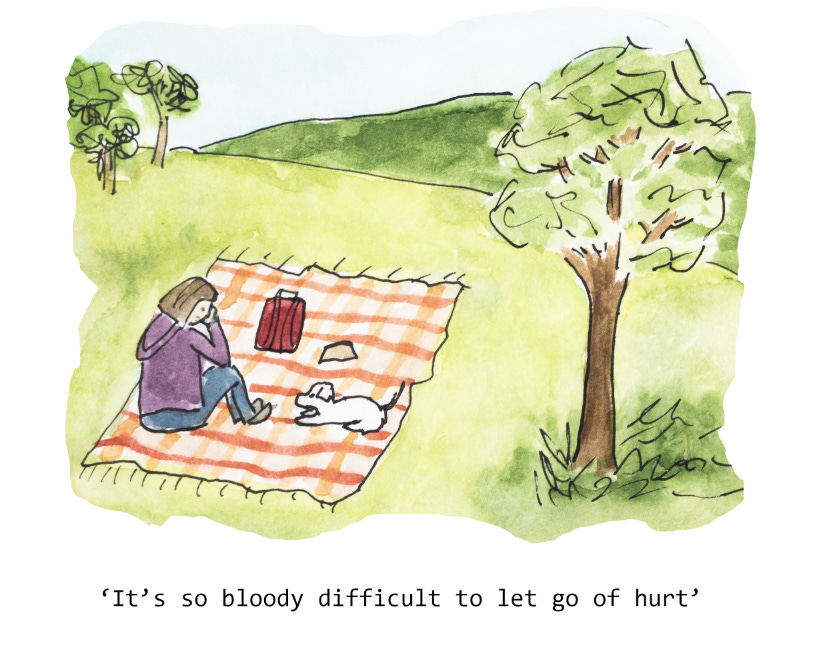‘I don’t think I can forgive anymore’ I sobbed as my friend gently insisted I go home from work. I had crumpled at my desk overwhelmed with pain and distress. It was about 8 weeks since I had discovered my friend’s suicide. And now another huge broken promise had to come to light. Try as I might I could not ‘pull myself together’ to function. My coping facade had truly slipped.
I had never felt pain like this. I’d had: knee surgery, a c-section, migraines, and broken bones. I would have had them all again, in exchange for this emotional pain and confusion.
As a Christian, I felt I had to forgive but I was struggling to figure out how. I went to faith-based resources on the net. What I found increased my distress. What I read seemed to minimise my pain and make me feel guilty for my anger. I didn’t get it, what I read would not settle with me. I wanted so desperately to forgive but I couldn’t pretend I didn’t hurt. I needed reality, not pretense. And as for anger, well, God Himself gets angry ‘for his anger lasts only a moment, but his favor lasts a lifetime’. (Psalm 30 v5) Anger is a natural response to being wronged. I wanted to be able to acknowledge and process my anger. I did not want it to turn into bitterness. I wanted to be able to find joy in the future.
I came across the really interesting work of Fred Luskin a Professor at Stanford University. I highly recommend his book Forgive for Good. His research shows that holding a grudge is hazardous to your health. He presents a process for letting go of anger and finding peace through forgiveness.
“To forgive is to set a prisoner free and discover that the prisoner was you.”
Ian Smedes
I saw that forgiveness would be good for me and that it was more than a religious concept or demand. It was a spiritual action that would help me heal. Forgiveness was a decision, an action at a point in time. The healing that would follow would be a process over time.
I agreed with Prof Luskin that whilst the forgiveness concepts were simple the execution of it was hard. As I reflected on his work and my situation. An analogy came to my mind. Join me in it in your imagination:
You are a passenger in a car with a friend. Your friend drives recklessly and endangers your life. They crash causing major leg injuries and the need for surgery. As you recover in the hospital you have the decision to make. Are you going to pursue your friend for compensation and insist they are prosecuted and punished?
If you forgive, you can choose to say no, I do not want them punished. I choose to release them from an unpayable debt! I want them to do well. I believe if an injured party does this they can focus on healing and rehabilitation.
Recovery will take time and the decision to forgive will not make it a pain-free process. I have a knee scar from surgery after a skiing accident 26 years ago. Most of the time I don’t know it’s there but if I do something that stresses it, it still complains today. It’s well-healed but it can still niggle.
As for you and your friend’s relationship, well this is a separate issue. In order for it to be reconciled your friend must accept your forgiveness. They must change, apologising or trying to pay you back will not work! They need to genuinely commit effort to drive well. If this happens I believe it’s possible for the relationship to be rebuilt and trust eventually restored.
More recently I read The Choice by Dr. Edith Eger. Her book tells her amazing true story. Edith was a gymnast and ballerina when she was sent to Auschwitz at the age of sixteen. She suffered unimaginable horrors and made it through the war, barely alive. She recovered and moved to America, going on to become an eminent psychologist. The book is a difficult and poignant read. It affected me profoundly. I saw in Edith the power and freedom that comes from forgiveness.
“To forgive is to grieve—for what happened, for what didn’t happen—and to give up the need for a different past.”
Edith Eger, The Choice
When I considered Edith’s story my traumas seemed small. However, Edith herself says “I don't want you to hear my story and say, "My own suffering is less significant." I want you to hear my story and say, "If she can do it, then so can I!” In the spirit of: so can I, I decided to stop ruminating on ‘what if?’ and instead mull over what could be. That thought may have been the first seed of Rafiki Art: Inspiring Hope.
The illustration I’ve included with this piece shows me struggling with my emotions and pain as I tried to forgive. Somehow with my faith (the ultimate example of Jesus), the research of Prof Luskin, and the exhortation of Edith Eger, I have forgiven. The reality is I am still dealing with some consequences of my trauma. But I am free of any bitterness and that feels good!
What are your thoughts on forgiveness? Does my car crash analogy make any sense to you? Have you read ‘The Choice’? Do leave your thoughts or questions in the comments.



